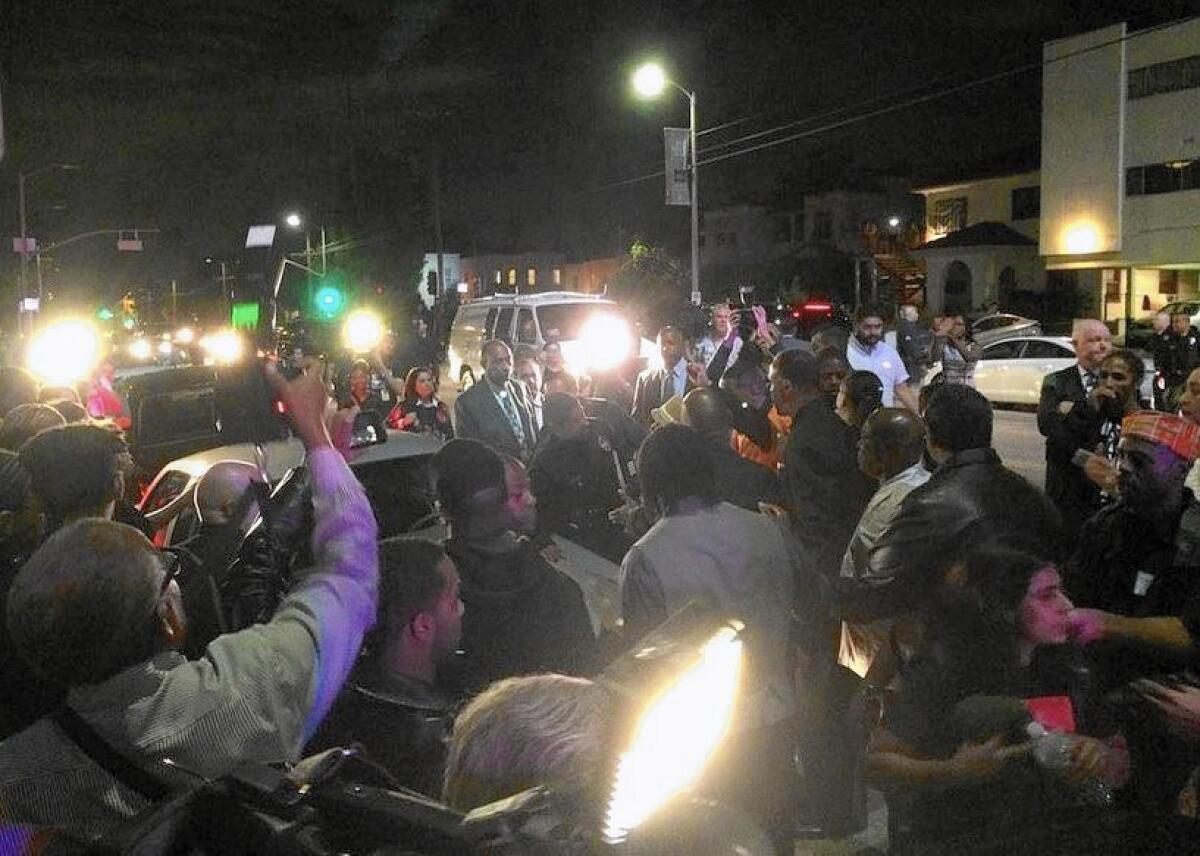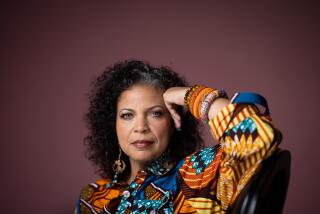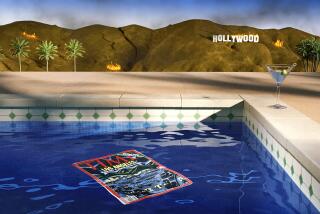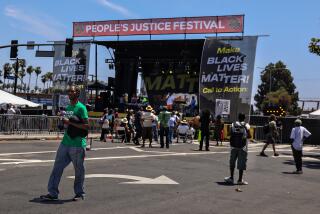L.A. leaders struggle with disruptive ‘Black Lives Matter’ protests

- Share via
A year ago, protests over police treatment of African Americans drew hundreds to the streets of Los Angeles, where marchers blocked traffic and made their way onto the city’s busy freeways.
Today, the big crowds have faded. But a cadre of activists under the Black Lives Matter banner have kept the movement alive in the city with smaller but decidedly aggressive protests targeting top L.A. police officials and the mayor.
The disruptive tactics pose a political challenge for city leaders who are still struggling to effectively engage the activists about issues that have prompted heated debate across the country.
Protesters have camped outside police headquarters and regularly disrupted the city Police Commission’s weekly meetings, turning normally dry public hearings into hours-long confrontations that frequently devolve into officers clearing demonstrators from the room.
The group has also set its sights on Mayor Eric Garcetti. A summer protest outside his Windsor Square home turned into an embarrassing episode, captured on video and spread on the Internet, when he left through a back gate for a trip to Washington, D.C.
On Monday, about 50 of the group’s supporters confronted the mayor at a town hall meeting in South Los Angeles, forcing Garcetti to make a hasty retreat to his car, surrounded by police and shouting audience members.
Local activists said they’re doing what it takes to keep issues like police reform and better representation for black Angelenos in front of the public.
“Our lives are on the line,” said Melina Abdullah, a Cal State Los Angeles professor and organizer for Black Lives Matter. “We cannot live in a city that has such disregard for black life.”
But others questioned the group’s approach, saying it could alienate Angelenos — including other African Americans — who are otherwise sympathetic to the issues they are raising.
The pastor of the church where the meeting was held said he was “disturbed and disappointed in Black Lives Matter” for its actions. “We certainly understand the rage because of the challenges in South L.A.,” Rev. Kelvin Sauls said. “But amidst that, we do not want to violate our own integrity.”
Monday’s chaotic town hall was the latest chapter in the often-tense political and legal dance between Black Lives Matter and city officials.
Earlier this year, the city attorney’s office sought a restraining order on behalf of Garcetti and Los Angeles Police Department Chief Charlie Beck against two protesters who crashed a private meeting between the pair. A judge later denied the request.
This summer, the Police Commission considered imposing new rules intended to curb interruptions during weekly meetings. The proposal drew harsh criticism from civil libertarians who charged the panel was infringing on free speech rights. The board later dropped the contentious language in approving a new set of rules.
After Monday’s clash, city leaders took great pains to support the rights of the protesters and the thrust of their message.
Garcetti, speaking to reporters Tuesday morning, pointedly declined to criticize the protesters’ conduct the night before.
“As mayor, that’s part of the job. Sometimes people scream. Sometimes people shout,” he said. “Any person who talks about their frustrations … you know, those are real problems with jobs, with housing, with policing. But I just keep doing the work.”
City Council President Herb Wesson, the city’s highest-ranking black elected official, defended Garcetti, saying the mayor “handled himself as well as could be expected” at the town hall. But he said the activists have a legitimate perspective and deserve attention.
“We have a community, or individuals from the community, that are in pain, angry and frustrated with some things,” Wesson said. “I know a lot of those people. They’re just great people and they need an opportunity to express themselves.”
Police commissioners also weighed in Tuesday. The panel’s president, Matt Johnson, who attended the town hall, said he was disappointed that it was “cut short because a few people had a different agenda.”
“What’s too bad is the message is important, but the messengers have lost trust and credibility by their actions,” said Steve Soboroff, the board’s vice president.
Others who attended the town hall shared Soboroff’s view, saying the issues the activists were trying to raise were overshadowed by their actions.
“I didn’t know it was going to be a Black Lives Matter meeting,” said Jackie Hawthorne, who’s lived in South L.A. for four decades. Hawthorne said she didn’t know much about the movement, but didn’t get a chance to learn more about the group because of the way the meeting unraveled.
“I am so angry,” she said, shaking her head as a police helicopter circled above. She turned to a group of protesters walking out of the parking lot.
“Go home,” she said. “Go away.”
The phrase “Black Lives Matter” became widely popular after protests erupted in Ferguson, Mo., in August 2014 when a white police officer shot Michael Brown, an unarmed, black 18-year-old. “Black Lives Matter” became a rallying cry during protests over police killings of black men around the country, including the Ezell Ford shooting in L.A. But it is a highly decentralized movement whose message spreads through social media.
The Los Angeles branch has enveloped other anti-police groups, creating a small but vocal group of activists who routinely criticize the LAPD for shootings by officers. Abdullah says the organization is an alliance with no single leader or spokesperson. She estimates the group’s supporters in L.A. run into the hundreds.
The group didn’t arrive at Monday’s meeting intending to shut it down, she said. But Garcetti began touting his own accomplishments as mayor, she said, rather than giving community members adequate time to voice their concerns.
Abdullah and other protesters have outlined a series of demands to Garcetti and the police commissioners, most prominently that they fire Beck for his handling of the LAPD and recent police shootings. They’ve also called for a series of mayoral town hall meetings with more public give and take, as well as increased input on appointments to city commissions.
Despite the criticism, Abdullah said, the local movement has had an impact. She said the group continues to diversify, bringing in new activists of different ages and social backgrounds. Most importantly, she said, city officials know they are there.
“We just want to make it known that we are watching,” she said. “We’re always going to be present and we’re always going to speak out for the community.”
[email protected] Twitter: @katemather
[email protected] Twitter: @PeteJamison
[email protected] Twitter: @AngelJennings
ALSO
L.A. judge brings grenade to courthouse, triggering bomb squad’s arrival
San Diego police kill man who pointed a gun at them, officials say
Bob Barker trips on L.A. sidewalk and injures his head
More to Read
Sign up for Essential California
The most important California stories and recommendations in your inbox every morning.
You may occasionally receive promotional content from the Los Angeles Times.













